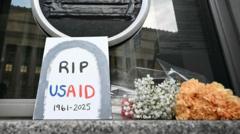The United States Agency for International Development (USAID), responsible for distributing billions in aid, faces significant cuts and a suspension of its programs under President Trump's administration. This policy shift has raised fears about potential outbreaks and a delay in medical research. The announced freeze, described as a 90-day review to align with "America First" priorities, has triggered chaos among health organizations reliant on these funds. Health experts argue that the ramifications of dismantling USAID will echo far beyond American shores, especially regarding programs targeting severe diseases such as tuberculosis (TB) and HIV.
Dr. Tom Wingfield, a tuberculosis specialist, highlighted the critical role USAID plays in health initiatives, including nutrition and sanitation, which are vital for controlling TB and other infectious diseases. He stressed the possibility of increased illness and mortality resulting from cuts, as many individuals lack access to care. "Disease knows no boundaries," he warned, emphasizing the interconnected nature of global health.
Additionally, the freeze affects many non-governmental organizations (NGOs) providing essential HIV care and treatments, risking setbacks in progress achieved over the years. Frontline AIDS, an organization operating across numerous countries, reported that partners are already suspending vital services due to unclear communication regarding the funding halt.
Prof. Thomas Jaki from the University of Cambridge expressed concerns about disrupted clinical trials for new treatments, projecting severe delays in advancements for diseases like malaria and HIV. Prof. Rosa Freedman warned that if the freeze continues, it could lead to a resurgence in rejected diseases and an increase in global health crises due to halted vaccination efforts.
In a world where health systems are often interconnected, experts fear that these setbacks could yield dire results, with preventable diseases likely to spread without proper funding and resources.
As the situation continues to unfold, global health advocates are rallying for clarity and action to prevent further degradation of vital health services that millions depend on.
Dr. Tom Wingfield, a tuberculosis specialist, highlighted the critical role USAID plays in health initiatives, including nutrition and sanitation, which are vital for controlling TB and other infectious diseases. He stressed the possibility of increased illness and mortality resulting from cuts, as many individuals lack access to care. "Disease knows no boundaries," he warned, emphasizing the interconnected nature of global health.
Additionally, the freeze affects many non-governmental organizations (NGOs) providing essential HIV care and treatments, risking setbacks in progress achieved over the years. Frontline AIDS, an organization operating across numerous countries, reported that partners are already suspending vital services due to unclear communication regarding the funding halt.
Prof. Thomas Jaki from the University of Cambridge expressed concerns about disrupted clinical trials for new treatments, projecting severe delays in advancements for diseases like malaria and HIV. Prof. Rosa Freedman warned that if the freeze continues, it could lead to a resurgence in rejected diseases and an increase in global health crises due to halted vaccination efforts.
In a world where health systems are often interconnected, experts fear that these setbacks could yield dire results, with preventable diseases likely to spread without proper funding and resources.
As the situation continues to unfold, global health advocates are rallying for clarity and action to prevent further degradation of vital health services that millions depend on.























